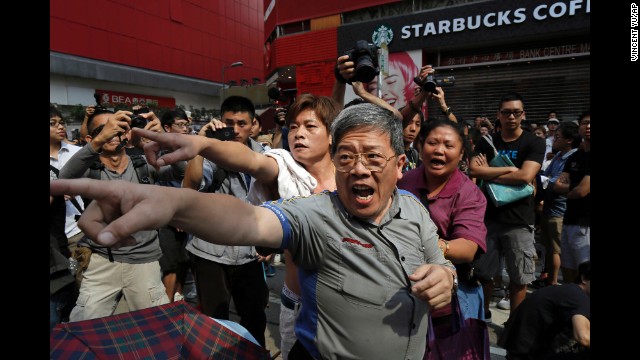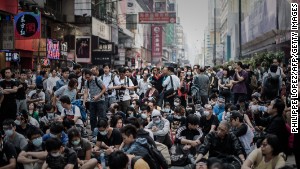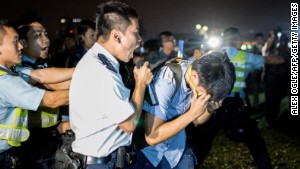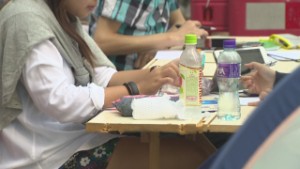Pro-democracy demonstrators recapture part of bustling district in Hong Kong
October 18, 2014 -- Updated 1250 GMT (2050 HKT)
Source: nathan mauger
STORY HIGHLIGHTS
- NEW: Talks between government and protesters to take place Tuesday
- NEW: Pro-democracy protesters swell to 9,000 in busy Hong Kong commercial district
- NEW: Hundreds of people and a handful of officers are injured in the violence
- NEW: Some dozen protesters were arrested on a number of charges
Hong Kong (CNN) -- Pro-democracy demonstrators seized back part of Hong Kong's bustling Mong Kok district Saturday after a night of scuffles.
Spurred on by police attempts to reopen part of the district to traffic, the protesters' numbers increased overnight, swelling to around 9,000, according to Hong Kong police.
By Saturday morning, the demonstrators had reclaimed the territory that they had ceded less than a day earlier.
Amid the tussling, Hong Kong Chief Secretary Carrie Lam, the government negotiator, announced Saturday that talks with pro-democracy protesters will take place Tuesday, with Lingnan University President Leonard Cheng as moderator.
"The meeting is expected to take place for about two hours," she said, adding that it will be broadcast live but not open to the public.
The reaction from Yvonne Leung, spokeswoman for the Hong Kong Federation of Students, was lukewarm at best. She said in statement that the protest group didn't "have much opinion" about the details of the meeting.
On the streets, meanwhile, the situation remains highly volatile, with the protests continuing through the weekend.
Protesters crossed police lines, authorities said, clashing with officers as the situation turned violent.


At least 240 people were injured over the past 24 hours, according to the Hong Kong Hospital Authority, which manages all public hospitals in the city.
Eighteen police officers were injured, Hong Kong police said.
At least 33 people were arrested and faced various charges, including property damage, disorderly conduct, weapons possession and resisting arrest, police said.
Violence erupted after police conducted a dawn raid Friday on a student protest camp in the commercial and residential area of Kowloon.
Authorities moved to clear a major intersection occupied by the pro-democracy protesters for almost three weeks, tearing down tents and dismantling barricades.
Around 500 to 600 police carrying wire cutters and riot shields stormed the Mong Kok site, a smaller offshoot of the main downtown protest area, catching the 100 to 200 protesters by surprise.
Police also used a crane to tear down makeshift structures.
Source: CNN



University student Adrian Lui, who had been at the protest camp for three days, said he was sleeping when the police moved in.
"They were running towards us with shields and at that moment we were nervous," he said. "Lots of people got spooked and ran down side streets."
Government offers talks
Hong Kong leader C.Y. Leung said Thursday that the government was eager to resume talks with the main student group as early as next week.
However, he said the city's tolerance of mass sit-ins was limited and the standoff could not carry on.
One of the main student groups, the Hong Kong Federation of Students, said late Thursday it was willing to have dialogue but said it hadn't been approached by the government or its representatives.
Protesters continue to occupy a major thoroughfare in Admiralty, close to the city's financial district and government headquarters, but police have chipped away at the area held by protesters this week by removing barricades and opening roads to traffic.
Smaller numbers
At the peak of the protest in early October, tens of thousands of people came onto the streets at three locations in Hong Kong -- Admiralty, Causeway Bay and Mong Kok -- to call for universal suffrage.
But numbers have dwindled as the protests stretched into a third week.
Protesters want to be able to nominate candidates for the election of the city's chief executive in 2017. Instead, China's National People's Congress has said they'll be able to vote from a shortlist approved by a pro-Beijing committee.
Leung said Bejing would not retract its decision.
Currently, the chief executive is elected by a specially-appointed 1,200 member election committee.
No comments:
Post a Comment